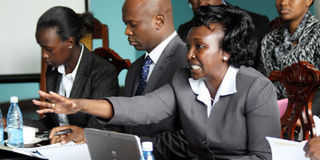Judiciary put to task over plan to buy plane

Chief Registrar Gladys Shollei as she represented a team from the High Court during a meeting at Parliament Buildings in Nairobi, June 4, 2013. Several Government departments appeared before the committee. PHOTO/STEPHEN MUDIARI
What you need to know:
- Chief Registrar Gladys Shollei appeared before the parliamentary Budget Committee chaired by Mbeere South MP Mutava Musyimi to explain why the Judiciary wants to buy rather than hire an aeroplane.
- The registrar told the committee that in some far-flung areas, judicial officers were not going to work because they were not being supervised. In Lodwar, for example, suspects are often taken to court six weeks after arrest instead of the 24 hours provided for in law.
- From her presentation to the committee, there are now 68,033 pending civil and criminal matters in the courts. There are a total 10,825 land and environment matters and another 1,053 industrial court matters, labour disputes and miscellaneous applications.
MPs Tuesday asked the Judiciary to explain why it intended to buy a fixed-wing plane for Sh300 million when it would be cheaper to rent one on a need basis.
The aeroplane is one of the items in the budget for the Judiciary which has proposed to spend Sh24.1 billion in the coming financial year — Sh17.1 billion on recurrent and Sh7 billion on development expenses.
Chief Registrar Gladys Shollei appeared before the parliamentary Budget Committee chaired by Mbeere South MP Mutava Musyimi to explain why the Judiciary wants to buy rather than hire an aeroplane.
The matter arose soon after Mrs Shollei had finished making her presentation to the committee which is scrutinising the Budget estimates presented to Parliament by the three arms of government.
However, most MPs in the committee dwelt on the Sh300 million allocation for the aeroplane.
Suba MP John Mbadi raised the matter when the legislators were given the chance to seek clarifications from Mrs Shollei and her team.
Describing the proposal as ambitious, Mr Mbadi asked why the Judiciary would not outsource air transport services rather than buy a plane that would require insurance and maintenance.
“We’re ambitious but it’s not an ambition we can’t achieve,” Mrs Shollei replied.
She said the Judiciary had the same coverage of the country as the Kenya Wildlife Service and the police and needed to reach far-flung areas of the country.
Areas such as Marsabit and Lokichar in the north are difficult to reach, she said, and the long delays in delivering justice in those areas was unfair to those living in those regions.
The aeroplane would be used to fly judges, their assistants and Judiciary staff to areas that are hard to reach by road.
It would also be used to fly the Judiciary’s top brass whenever they needed to assess the performance of their juniors.
She said the plane would be under the management of the KWS and could be leased out whenever the Judiciary was not using it to recover the cost of purchase.
She told the committee that given that it cost about $1,500 (Sh127,500) per hour to lease a helicopter, it would be cheaper for the Judiciary to own and operate an aeroplane.
The registrar told the committee that in some far-flung areas, judicial officers were not going to work because they were not being supervised. In Lodwar, for example, suspects are often taken to court six weeks after arrest instead of the 24 hours provided for in law.
Besides the aeroplane, the Judiciary is also proposing to spend Sh334.6 million to buy additional vehicles for the High Court. This will include 50 Land Rovers to be used to ferry Judiciary staff to mobile courts in areas without the necessary buildings and other infrastructure such as Daadab, Lokichar, Mutomo and Kyuso.
But this wasn’t enough to convince the committee members and the Rev Musyimi asked her to provide the team with a document showing the rationale behind buying a plane instead of leasing one on a need-to basis.
He said the Judiciary could be forced to start handling matters beyond its primary responsibility.
“We’re caught here in a serious balancing act and we’ll have to ask ourselves that we have so much money; does it go to the police or the Judiciary?” he asked.
Mr Richard Onyonka (Kitutu Chache South, ODM) said the Judiciary ought to have better ways of monitoring its staff such as closed-circuit television and teleconferencing.
He said from Mrs Shollei’s explanation, any government body could use the same argument to buy an aeroplane and proposed that ministries agree to share planes from a common pool.
However, Mrs Shollei said sharing planes would be a challenge because of the competing interests of the police, the KWS and other government agencies.
The Rev Musyimi asked her to provide a detailed explanation and an analysis of the benefits the Judiciary would get by having the plane.
Asked for an interview after the meeting, Mrs Shollei said she would also provide the Press with a copy of the explanation to the committee by the end of the day.
From her presentation to the committee, there are now 68,033 pending civil and criminal matters in the courts. There are a total 10,825 land and environment matters and another 1,053 industrial court matters, labour disputes and miscellaneous applications.
A total 103 magistrates were hired this financial year, taking the number to 421. The Judiciary is planning to recruit 40 more High Court judges to add to the current 53. The Land and Environment Court has 15 and the Industrial Court 12 judges each.
Mrs Shollei told the committee the decentralisation of the Court of Appeal from Nairobi to Nyeri, Kisumu and Malindi had improved the delivery of justice.




